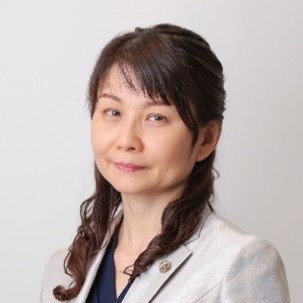
Yayoi Hasegawa : Lawyer in Japan
Ex-vice chair of the Committee of International Human Rights (CIHR) in JFBA
In this session, we shared our experience and knowledge of online-based violence against women. Our panel consists of the following distinguished lawyers.
Ms. Gema Gita Persada, Public Interest Lawyer at Legal Aid Center for the Press in Indonesia.
Mr. Hirotaka Honda, Chair of the LGBT rights project of Japan Federation of Bar Association
Ms. Madhavi Goradia Divan, Senior Adovocate in the Supreme Court of India
And our session was moderated by the following lawyers.
Mr. Saroj K Ghimire, Attorney at law at Supreme Court of Nepal
Ms. Yayoi Hasegawa, attorney at law in Japan
At the beginning, atty. Gema Gita Persada shared the efforts to resolve the issue of online harassment against female journalists by Indonesian practitioners, with pointing out that the root cause of this issue is the intersectionality between the profession and gender identity of female journalists. Their challenges also inspired us to take the perspective of personal data protection in the context of digital harassment, such as doxing, hacking, and non-consensual intimate imagery. Moreover, the ongoing project for making a network all across Indonesia was introduced. The network consists of public interest lawyers in personal data protection, based on the fact that the same issues have happened, not only in urban areas but also in rural areas. This network is also collaborating with collective of practitioners and activists in gender issues which aims to avoid a wrong path in handling these issues in different places, including secondary damage in the relief process. It will be helpful for us as a reference for establishing networks internationally in the future.
Then, by atty. Hirotaka Honda, the new Japanese law regulating the employment of pornographic performance, which is unique to Japan, was introduced, which raised awareness of various concerns, including not only the need for protecting pornography performers but also the issue of moderation of digital content itself. It is noteworthy that human rights NGOs in Japan and civil society created the social movement and were deeply involved in enacting this legislation. Moreover, following the presentation about the production of performances by female teenagers in Japanese commercial entertainment, it is indicated that damage caused by semi-permanent publications, specific to digitalised entertainment, might cause new sexual exploitation of teenagers. With visual materials, the reality of online entertainment in this area appealed vividly to the floor.
Finally, from India, atty. Madhavi Goradia Divan gave us a lot of suggestions on our theme with various examples. Firstly, the severe paradox in line with the development of digital society was suggested, which means that although the development of digital technology empowers women to participate in social activities, it also enables societies to emerge online platforms for more extreme attacks against women, sometimes triggering human rights violation of women in the real world as well. Besides, what is the most impressive suggestion is that the harsh discrimination against women in the digital world is a mirror of our real world. In the context of the challenge to eliminate discrimination against women, the introduction of the progressive movement in the Supreme Court of India encouraged us in the session. Lastly, it is also emphasised that education is also essential to improve these situations.
After the presentations, some views were additionally argued by each speaker and, regarding the networking building, not only the necessity but also the difficulties were expressed by all the speakers. Also, we received some contributing comments from the floor. We, the organising team, appreciate all the participants in our session, with special thanks to our excellent speakers, that we had a fruitful session in Fukuoka.
